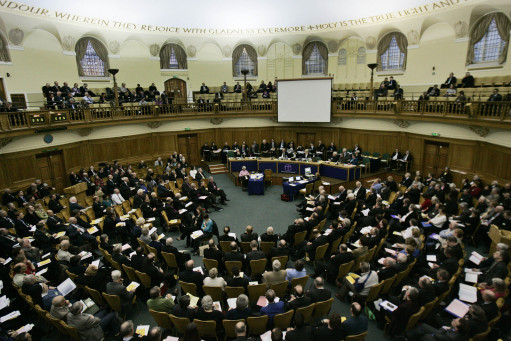Church of England: Philip Giddings survives lay vote

The chair of the Church of England's House of Laity, Dr Philip Giddings, has won a controversial vote to remove him from the position.
Lay members gathering at Church House in Westminster, central London, this afternoon debated whether Dr Giddings was fit to represent them after he took a strong stance against women bishops legislation in last November's General Synod debate.
The legislation to allow women into the episcopate secured the required two-thirds majority among bishops and clergy, but was six votes short in the House of Laity.
Some lay members suggested Dr Giddings' speech to Synod, in which he suggested the traditionalist minority would be excluded from the Church, had unfairly swayed wavering members into voting down the legislation.
Other lay members questioned whether there was a conflict of interest between Dr Giddings' role as chair of the House of Laity and his involvement in traditionalist groups like GAFCON and Anglican Mainstream.
Timothy Allen, of the Diocese of St Edmundsbury and Ipswich, said: "This is not a healthy situation. "
Canon Stephen Barney, who brought the motion of no confidence against Dr Giddings, said the defeat of the women bishops legislation had "injured the reputation and mission of our church".
"I feel deeply ashamed of this," he said.
Mr Barney accused Dr Giddings of being "partisan and narrow" during the General Synod debate and, with the majority of dioceses supporting women bishops, suggested he no longer had the authority and respect of the House to act and speak on its behalf.
"[Today's debate] is not in any way to impugn the integrity of Dr Giddings. I am also not suggesting that any ordinary member should do anything other than speak his or her mind on this or any other issue," he said.
"It is about what is appropriate conduct for someone with substantial influence, the most senior member in the largest constituency in the Church of England."
However, Mr Barney faced accusations of "unchristian" behaviour from lay members who suggested the motion of no confidence was bringing the Church further into disrepute.
Mrs Debrah McIsaac, of the Diocese of Salisbury, said Dr Giddings was being made into a "scapegoat", while Mrs Joanna Monckton, of the Diocese of Lichfield, said the vote was "cruel" and sent the message of an "intolerant" Church.
However, there was broad agreement on both sides of the need for greater clarity regarding the role of the chair.
Dr Giddings survived the vote of no confidence with 80 votes against, to 47 for. There were 13 abstentions.
Addressing the House of Laity after the vote, said he was "grateful" for the outcome and intended to continue in office.
He agreed that changes needed to be made, including a dialogue on the nature of the chair.
"I need to, in a sense, take my own medicine," he said.
"I will take careful advice from colleagues as to how we proceed from here … I hope and pray that we can now put this behind us and that temperatures can be lowered."











